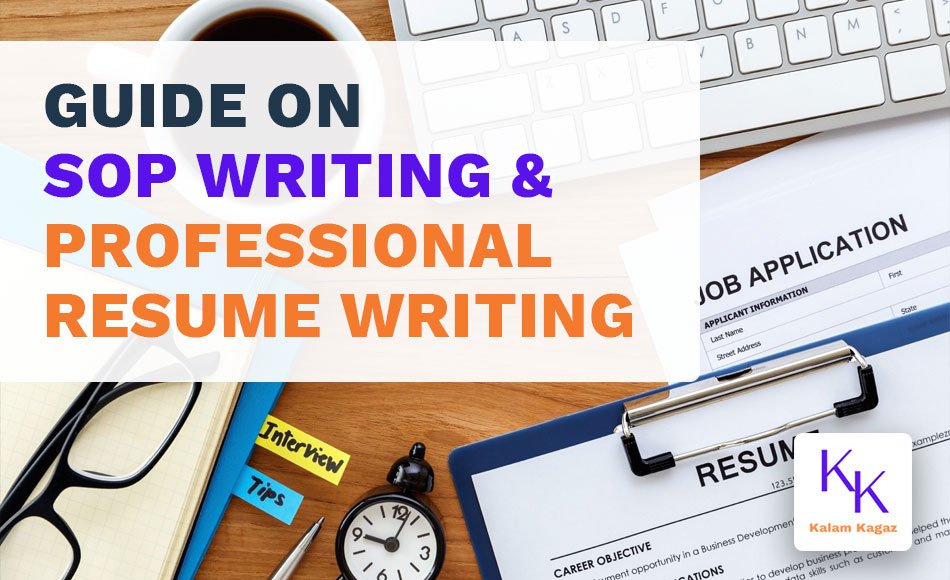- July 16, 2024
- by Kalam Kagaz
- Resume Writing, SOP Writing
Are you a student applying to study abroad or a professional searching for the next career opportunity? If so, you’re in the right place. An impressive Statement of Purpose (SOP) and a standout resume are essential tools that can open doors to your dream college or job. This guide offers practical insights and actionable tips to help you craft a compelling SOP and resume. So, grab a coffee and let’s dive in!
What is an SOP?
A Statement of Purpose (SOP) is a personal essay that tells the admissions committee who you are, what drives your academic and professional interests, why you’re applying to a specific program and institution, and what your future goals are. Think of it as a bridge between your past experiences and your aspirations. A well-written SOP not only showcases your personality but also highlights your research and writing skills—making it a key factor in admission decisions.
Why is an SOP important?
An SOP helps differentiate you from other applicants by giving insight into your unique motivations and potential contributions. Even if your academic record isn’t stellar, a thoughtfully written SOP can significantly boost your chances of acceptance. It’s your opportunity to tell your story in your own words and make a lasting impression.
Tips for Writing an Exceptional SOP
1. Keep it simple and engaging. Write clearly and avoid complex words that could confuse the reader. Your SOP should be easy to read but captivating enough to leave a memorable impact.
2. Be authentic. Be honest about your experiences and intentions. Admissions committees value sincerity over embellishment, and authenticity builds trust and credibility.
3. Create a logical flow. Present your story in a way that flows naturally. Organize your experiences chronologically and connect them to your future goals to maintain coherence.
4. Highlight your motivation Explain why you are passionate about the chosen program and why this particular institution is the perfect fit. Be specific about how it aligns with your career aspirations.
5. Customize for each application Tailor your SOP to the unique requirements and values of each institution. Mention specific courses, faculty, or facilities that excite you.
Structure of an Effective SOP
1. Engaging Introduction Start with a personal story, anecdote, or unique trait that captures the reader’s interest. Briefly introduce your academic and professional background.
2. Academic and Professional Journey Share key experiences that have shaped your academic path and career decisions. Explain how these experiences have prepared you for the program you’re applying for.
3. Why This Program and University Be clear about why you chose this particular program and institution. Highlight specific aspects that appeal to you and how they connect to your goals.
4. Career Goals Discuss your long-term and short-term aspirations. Show that you have a clear vision and are determined to achieve it.
5. Convincing Conclusion Wrap up by summarizing your passion, readiness, and enthusiasm for contributing to the program and institution.
Personalized Touch
Make your SOP personal by sharing an experience or challenge that influenced your decisions. Keep the tone professional but let your personality shine.
What is a Resume?
A resume is a concise document summarizing your professional background, education, and skills. Tailored to each job application, it helps employers quickly assess if you’re a good fit for the role.
Importance of a Good Resume
A well-structured resume is often your first chance to impress a hiring manager. It acts as a snapshot of your qualifications and sets the stage for an interview.
Tips for Crafting a Winning Resume
1. Prioritize clarity Use simple, clear language. Avoid jargon and fancy words that complicate your message.
2. Maintain consistency Stick to a clean format. Use uniform fonts and bullet points, and avoid graphics or tables that can confuse automated tracking systems.
3. Express, don’t impress Focus on substance over style. Share concrete achievements instead of listing duties.
4. Tailor for the role Customize each resume to the specific job. Highlight relevant experiences and use keywords from the job description.
5. Use relevant keywords Research industry-specific keywords and incorporate them naturally.
Resume Structure
1. Introduction with Objective Start with your name and a brief objective that outlines your career goals and interest in the position.
2. Contact Information Include a phone number, email, and LinkedIn profile. Make sure your email and links are clickable.
3. Work Experience List your professional experience in reverse chronological order, focusing on achievements rather than responsibilities.
4. Educational Background Highlight your academic qualifications, listing your most recent degree first. Mention relevant projects or internships.
5. Skills and Additional Information Include technical skills and any certifications relevant to the job. Avoid vague qualities like “hardworking” or “dedicated” unless demonstrated through achievements.
Do’s and Don’ts of SOP and Resume Writing
Do’s
Get professional feedback if you’re unsure about your writing.
Use a conversational tone while remaining professional.
Keep within word limits to respect guidelines.
Proofread thoroughly to catch grammar mistakes and typos.
Research thoroughly to align your content with the institution or job.
Don’ts
Avoid grammatical errors at all costs.
Never plagiarize content from online sources.
Don’t repeat words or phrases unnecessarily.
Skip florid language; be concise and to the point.
Eliminate irrelevant information to keep your content sharp and focused.
Conclusion
Crafting a strong SOP and resume can significantly impact your future. By following these guidelines and personalizing your approach, you can create documents that resonate with admissions committees and recruiters alike. There’s no one-size-fits-all solution, so take your time, refine your drafts, and ensure they represent the best version of you.
FAQs
1. What is an SOP, and why is it important?
An SOP (Statement of Purpose) is a personal essay required by universities for admissions, where you explain your academic background, career goals, and reasons for pursuing a particular course. It is important because it helps the admission committee understand your motivation, aspirations, and how you fit with their program. A well-written SOP can set you apart from other applicants.
2. How can professional resume writing services help me?
Professional resume writing services can help you present your skills, experience, and achievements in the best possible light. Experts will tailor your resume to highlight your strengths, making it more attractive to employers and increasing your chances of getting noticed. They also ensure your resume is ATS-friendly, so it passes through applicant tracking systems used by many companies.
3. What should I include in my SOP for a university application?
In your SOP, you should include your academic background, why you’re interested in the specific course, your long-term career goals, and how the program aligns with your aspirations. It’s also important to mention any relevant experience or skills that support your application. A personal touch, like a story or experience that inspired your decision, can make it more engaging.
4. How long should a professional resume be?
A professional resume should ideally be one page for entry-level applicants and up to two pages for those with more experience. The key is to keep it concise, focusing on relevant skills and accomplishments that demonstrate your qualifications for the job. Employers often spend just a few seconds reviewing each resume, so it’s essential to make every word count.
5. Can I revise my SOP or resume after it’s been written?
Yes! Many SOP and resume writing services offer revisions to ensure that the final document meets your expectations. Typically, you can request changes, and the writers will adjust the content accordingly. This ensures your SOP or resume is perfect before submission.





